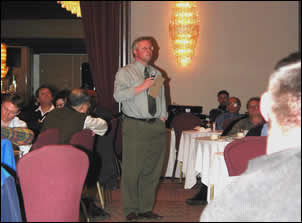 |
| APEGGA President Mike Smyth, P.Eng., listens to members
speak out about inclusivity, March 24 in Edmonton. |
APEGGA is giving members more time to
consider a new category of licensure under the Kananaskis
Model. As it now stands,
the new category for university-trained practitioners in
limited, defined scopes will be discussed – but not
voted on – at the Annual General Meeting, April 24
in Edmonton.
The category will not be brought forward for an actual
AGM vote this year.
“We have made every effort to engage our members in dialogue
on this issue,” said APEGGA President Mike Smyth,
P.Eng. “However, town hall meetings and other representations
make it clear to us that members still have a lot of questions
about what this means to the professions and what this
means to their Association. We welcome this input and will
build on this to ensure that we get it right.”
Also, Council still has the option of taking the new category
to a full membership vote, through a mail ballot. Normally,
actions that require changes to the EGGP Act, Regulations
and Bylaws are approved or rejected at the AGM but Council
can decide to use the mail-in ballot in exceptional circumstances.
The new category comes out of Council’s concern that
many university-educated applied scientists are currently
performing elements of engineering, geology and geophysics.
In order to better protect the public, these practitioners – who
don’t hold geoscience or accredited engineering degrees – should
come under the APEGGA regulatory umbrella.
That way, their practice will be evaluated by the Board
of Examiners for admission and regulated through the APEGGA
Code of Ethics, discipline system, mandatory Continuing
Professional Development and other self-governance functions.
Town hall meetings were held March 23 in Calgary and March
24 in Edmonton. All told, more than 300 members attended.
Most of those who spoke were either against the new category
or had serious reservations about various aspects of it.
Council is determined that members and other stakeholders
have sufficient time to become knowledgeable about the
proposed new category. Council proposed lengthening the
licensure bar only after much consideration, consultation
and debate, going back over a year.
A number of aspects of the new category will be revisited,
including the name. Council had proposed Registered Engineer,
Registered Geologist and Registered Geophysicist for the
titles. Many members, however, have said they think the
name downgrades the P.Eng., P.Geol. and P.Geoph. designations,
and will be confusing to the public.
“The name was also a subject of much debate at the Council
table and much consideration by the Inclusivity Task Force,” said
Mr. Smyth. “Council will re-visit this in view of
concerns expressed.”
Council also needs to look closely at the experience area
of the new category. The last version of the terms of reference
accepted by Council called for at least four years of experience,
with at least two of them in the application of the engineering,
geological or geophysical principles used in their defined
scopes.
“Two years in the scope may not be enough, given the recent
feedback from members,” Mr. Smyth said.
“Even though refinements are necessary, the concept of inclusivity
and the new category will be pursued,” he said. “Members
and others have certainly been vocal about the inclusivity
proposal in recent weeks, and, with the input we’re
receiving, I believe we will make our Association stronger
and more pertinent,” he said.
|



